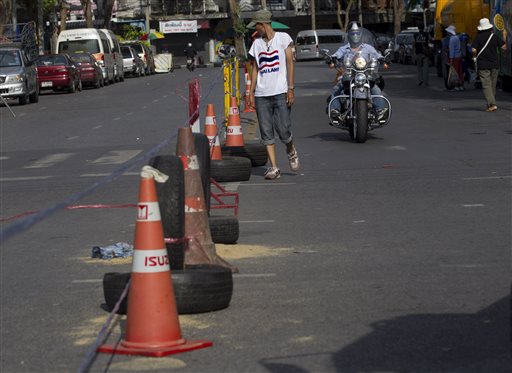‘Holy traffic cones’ become symbol of Thai crisis

An anti-government protester walks along cones in Bangkok, Thailand, Wednesday, May 14, 2014. Move a traffic cone placed by people who have spent six months taking over various areas of this politically volatile capital and you could get beaten, stabbed or shot. For many Thais sick of the chaos, it is a chilling thought, but also a chance to meme. Allegations that anti-government protesters have attacked several motorists for moving traffic cones have sparked a mix of outrage and creativity in political cartoons and online postings that went viral this week. AP
BANGKOK — Thailand’s political lexicon has a new term: the Holy Traffic Cone.
The term went viral this week after a series of vicious attacks on motorists who moved traffic cones that anti-government protesters had arbitrarily placed near rally sites.
A mix of outrage and creativity sparked political cartoons and online postings, including a widely shared Facebook photograph that shows five men kneeling in prayer with heads bowed to a cone on the street.
The message “Don’t touch the cone!” is circulating online. A cartoon listing objects that cannot be moved in Thailand depicts historical monuments and a traffic cone.
Thai Politictionary, a website of Thai political terms, added the term “Holy Cone” to its site Monday. Definition: “a sacred traffic barrier” deployed by security guards for the protest movement. “Whoever dares to touch, move or destroy the cone may be physically assaulted.”
Article continues after this advertisementThe orange pylon has come to symbolize the growing sense of hopelessness many Thais feel over the sometimes violent upheaval that has left the country in political disarray with bleak prospects for a resolution anytime soon.
Article continues after this advertisementLast week a court sacked Prime Minister Yingluck Shinawatra for nepotism, though her party remains heavily influenced from abroad by her brother, former Prime Minister Thaksin Shinawatra. Government opponents vow to keep protesting until a new, unelected government takes over to begin political reforms, while Yingluck’s supporters say they will take to the streets if that happens.
Parliament was dissolved late last year, the results of partial elections in February were thrown out and it is likely that political tensions will scuttle the caretaker government’s plan to hold elections in July.
Both government supporters and opponents have been blamed for violence that has killed more than 20 people and injured hundreds more since anti-government protests began in November, but it is the protest movement’s “security guards” — its hired toughs — who have been accused in the recent attacks over traffic cones.
A Thai military colonel was shot in the legs and beaten, allegedly by protest guards, on April 25 when he tried to move a cone blocking his route home.
On Friday, cell phone video footage that went viral allegedly showed protest guards repeatedly punching a motorist through his car window after he tried to move a cone on a Bangkok toll road.
The third and most attention-grabbing attack came Saturday, when an ice delivery man was stabbed repeatedly in his chest and stomach for moving a cone to make a delivery. The man remained under intensive care at a Bangkok hospital Wednesday.
No one has been arrested for the attacks.
“This is not just ridiculous and absurd, this is lawlessness,” said Pavin Chachavalpongpun, an associate professor at Kyoto University’s Center for Southeast Asian Studies. “The sacredness of the law has disappeared.”
“Eventually the cone parody online will die down, but the reality will continue,” he said. “Those opposing the government are creating a situation of lawlessness and simultaneously acting as though they are the law enforcers.”
Protesters have denied involvement in the attack on the delivery man, but Luang Pu Buddha Issara, a monk who is among the protest leaders, told the Daily News newspaper on Sunday that he did not deny the other reports. He asked the public to understand the protesters’ safety concerns. He said cones at the scene of one of the attacks, on an elevated tollway, were intended to keep traffic away from a spot where attackers might fire grenades at protesters on the ground level.
“I’d like to use this channel to apologize to the victims,” the monk said. “But please also give us some sympathy.”
The distraught mother of the colonel read out an emotional statement at a police station earlier this month, asking how such violence was possible in a Buddhist country that prides itself on gentleness.
“A Buddhist monk once told me that many animals have been reincarnated as humans,” said the mother, Bang-ornat Wattanakul. “I didn’t understand it. But now I do. These men still behave like wild animals.”
RELATED STORIES
Thai protest leader shot dead while giving speech in Bangkok
Third child dies from weekend of Thai protest violence